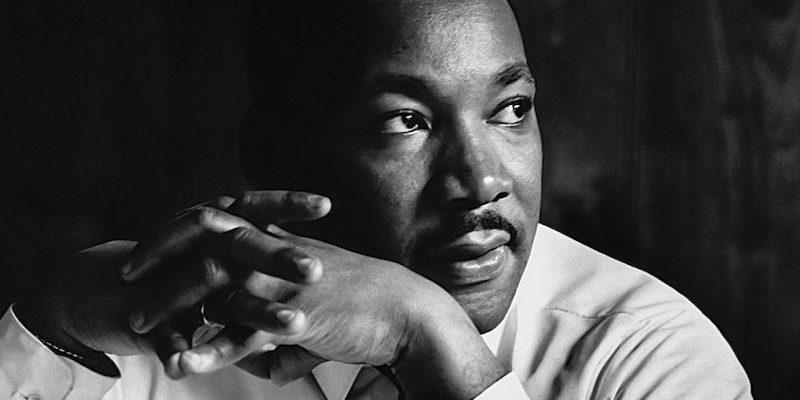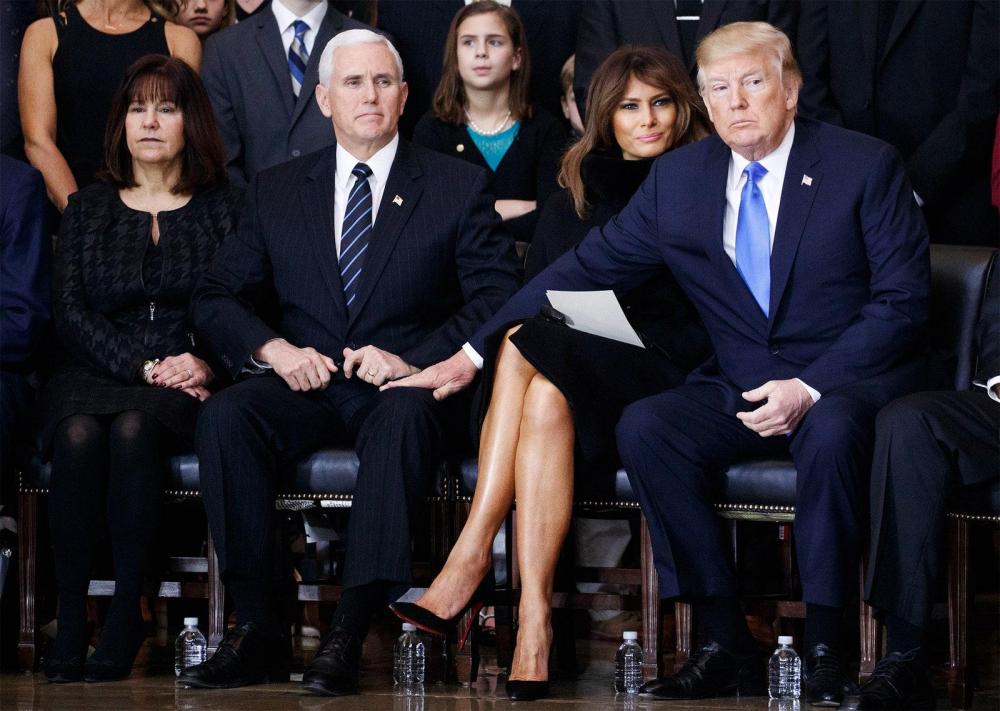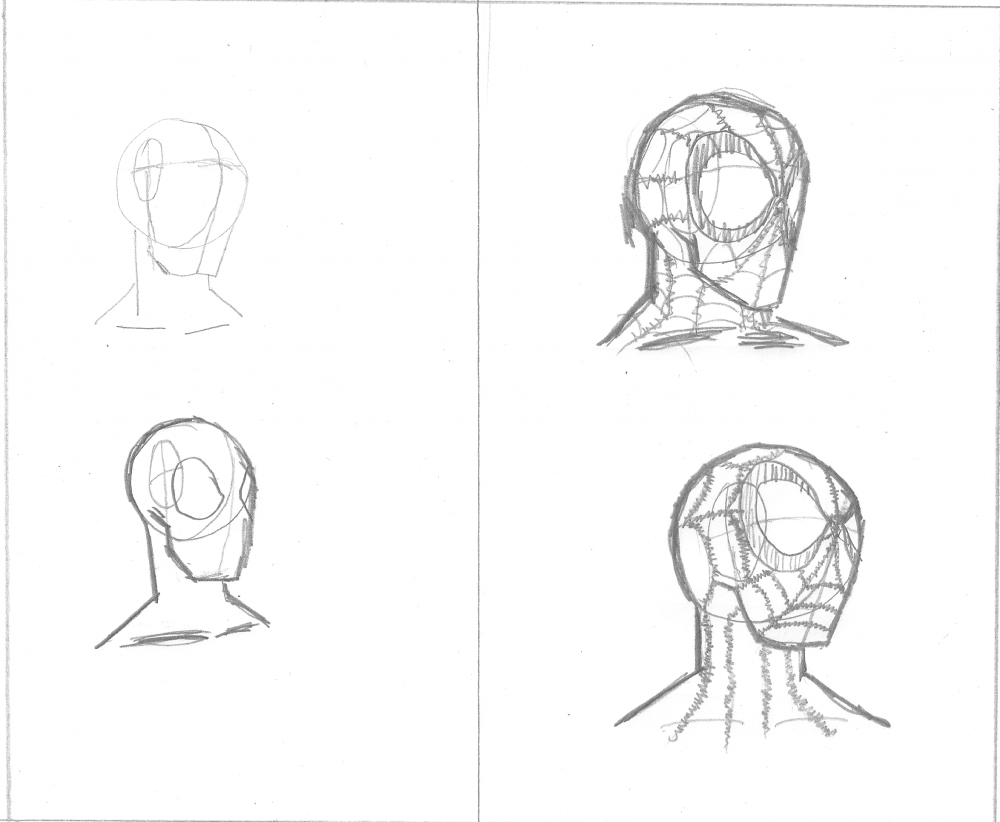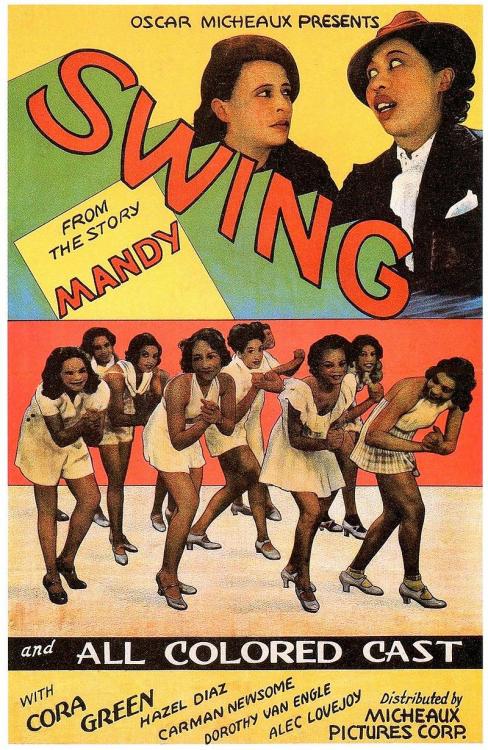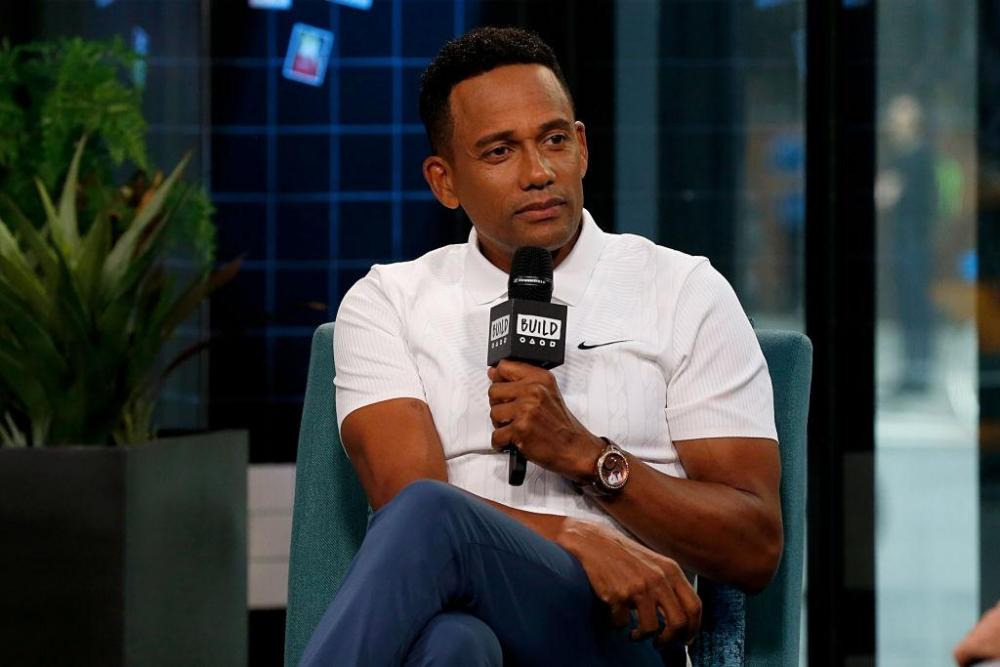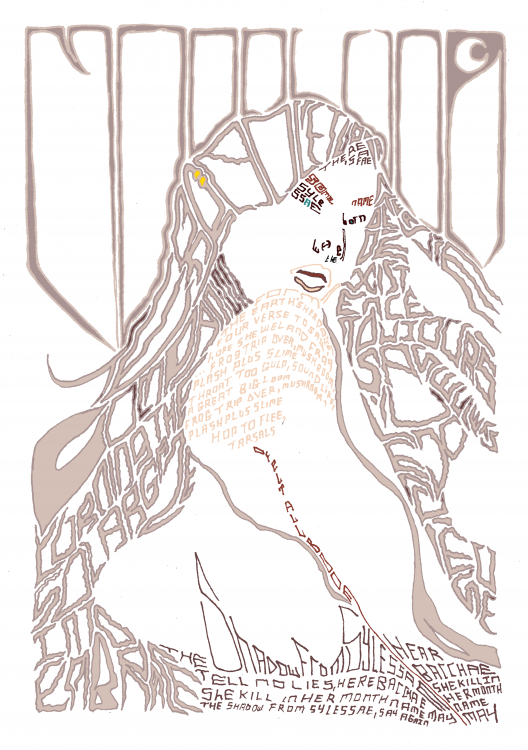-
Posts
2,415 -
Joined
-
Last visited
-
Days Won
91
Content Type
Profiles
Forums
Blogs
Events
Status Updates posted by richardmurray
-
Cowboy day
What is your favorite black cowboy tale?
https://aalbc.com/tc/blogs/entry/261-good-news-blog-stories-through-a-year/page/2/?tab=comments#comment-938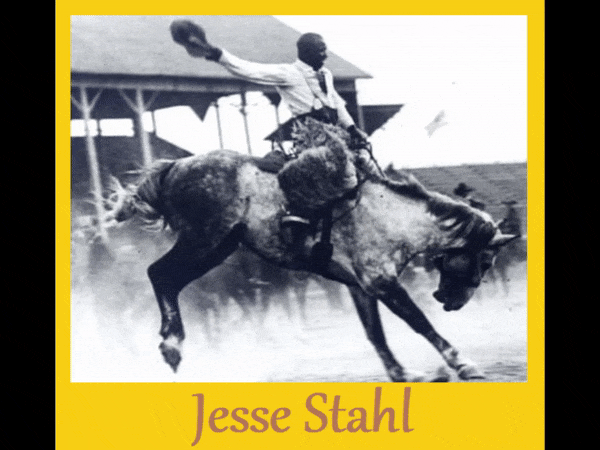
-
Well... it is another Friday, another day to love, to Oxum, Oshun, Freya, or Venus, another day to Kizomba! I love this setting, from Hedon and Roxanne. Everybody outside the brothers to the left, who are discussing something serious are looking at them dance in the area. THis show how people rarely come out in couples like they can or have that intimate fun. I love their routine too, I wonder if this was their first time dancing in this restaurant or if they do it regularly; their routine is very well organized to the space side activity.
-
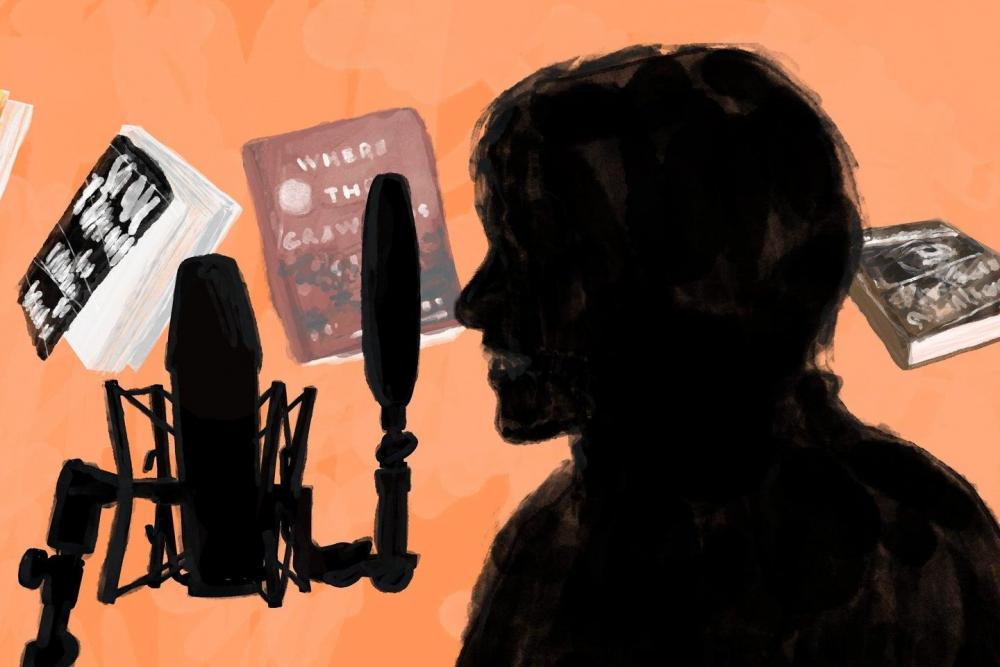
“I Probably Modeled Him on Something I’d Heard on The Wire”
The audiobook industry is collectively squirming through the cultural debate on representation and casting.
BY LAURA MILLER
Twenty years ago, Grover Gardner began narrating a series of comic mysteries whose title character is a white lawyer named Andy Carpenter. In the series—written by David Rosenfelt—Carpenter also has a partner, Willie Miller, who’s a Black ex-con, which means Gardner had to voice Miller too. Back then, he hardly gave any thought to the fact that he was a white narrator voicing a Black man. “I probably modeled him on something I’d heard on television, on Hill Street Blues, or The Wire,” Gardner said. Today, 14 books later, he’s still voicing Willie—but he’s changed his approach. “I’d think very hard about doing that kind of accent now,” he said.
In an era of heightened sensitivity to issues of representation and misrepresentation, it’s no longer acceptable to cast a white actor as a character of color in a movie or TV show. But audiobooks play by different rules. It’s customary now in the audiobook business to try to match a book’s narrator to the gender, race, and sometimes sexual orientation of a novel’s author or main character. Yet most novels feature characters with an assortment of different backgrounds, and this can require narrators to voice characters with identities very different from their own.
When audiobooks first rose to popularity in 1980s, the field was overwhelmingly white. Gardner, who has been an audiobook narrator for four decades and also works as a producer, recalls that, for the first couple of decades of his career, “the whole industry was geared toward middle-aged white businessmen” who listened to “books on tape” while on the road for work. There were hardly any narrators of color, and few female narrators back then, Gardner said. “I recorded Scott Turow’s [1990 novel] Burden of Proof. The narrator of that book is a Latino lawyer,” he told me. “I did it. We did whatever they sent us back then. But I wouldn’t do that book today. You would find a Latino narrator to do it.”
Apart from the amused response to the cartoonish accents Ronan Farrow rolled out when narrating the audio version of his 2019 exposé Catch and Kill, the audiobook world has so far been largely free of the sort of scandals that have triggered reckonings about representation in other creative industries, like magazine publishing and television. This is partly because it’s a low-profile, unglamorous field that doesn’t attract a lot of attention from the press. But many who work in the industry still feel the tensions around casting acutely. Amid a publishing boom in literature by writers of color, nonwhite narrators are being offered more work than they once were. Meanwhile, like most narrators, they find themselves getting asked to voice marginalized characters from backgrounds that bear no resemblance to theirs. January LaVoy, a biracial narrator who identifies as Black, said that cross-cultural audiobook narration is freighted in different ways for white narrators and narrators of color. “For many white narrators, it’s difficult because of fear [of backlash]. For many narrators of color, it’s difficult because of the weight of responsibility.” The industry is grappling with these issues daily. “It’s difficult for everyone,” LaVoy said.
Although some publishers have audiobook divisions, they usually function separately from the print division, and the audio rights for many titles get sold to separate companies such as Brilliance or Blackstone. The producer of an audiobook, who is employed by the publisher, acquires the rights and oversees casting and other big-picture decisions, such as opting for multiple narrators on a novel that often switches points of view.
Michele Cobb, a producer and the executive director of the Audio Publishers Association, told me that she and her colleagues have tried to figure out how they can sensitively ask narrators to provide producers with information about their backgrounds—such as gender identity, sexual orientation, and disability—that can be helpful when casting. Cobb explained that it’s an ongoing challenge to cast appropriate narrators for books by authors of color, while avoiding typecasting. In her own company, which publishes romance audiobooks, “I’ve definitely had authors come back and say, ‘Well, this character is white so I wouldn’t go with a Black narrator,’ ” a choice she feels obliged to respect.
Traditionally, both a director and an engineer, usually both freelancers, work on the recording with the narrator. Director Simone Barros outlined an exhausting list of tasks to me, from making sure the narrator doesn’t skip or add words to researching accurate regional pronunciations and maintaining continuity. “You can get to the last page of the book, and it will mention that a character had a German accent the whole time,” said Barros, speaks with the mile-a-minute lucidness of a person whose job is anticipating every contingency. Barros is of Cabo Verdean descent and identifies as Black.*
In the case of some first-person narrators, such as the one in Charlie Kaufman’s Antkind, an audiobook Barros directed, the book is “written so much within the perspective of the first person that the ethnicity of other characters are specifically heard from the narrator’s perspective of them. More specifically in Antkind, the author’s very point is this shifting, mutable and even unreliable perspective, to shine a light on how too often minority characters go unseen, or only seen or heard through a bias cipher.” But with a book written in the third person, she and her narrator will work up a full voice profile—a cache of recorded dialogue and biographical information—for each speaking character. That way, if, say, a villain appears in a novel’s first few pages only to disappear for several chapters, the narrator and director can remind themselves of what he sounds like. Such profiles are particularly helpful with recurring characters in sequels and series, which may be recorded years later.
In the past, it was largely left up to the professionals behind the scenes to anticipate and head off any problems. Ten years ago, it wasn’t uncommon for a book’s author—the person most intimately acquainted with a title—to have no input at all in the audiobook production. But as audiobooks became a more mainstream and high-profile format, authors began seeking more oversight. Today, writers often get the final say on casting, and are often invited to choose a narrator from a selection of sample recordings and encouraged to provide crucial information about how characters ought to sound. Nathan Harris, a Black writer whose debut novel, The Sweetness of Water, is set at the end of the Civil War, knew the accents of his multiracial cast of characters, who include freed slaves, would be a challenge. “You can go down a very precarious road with how they sound,” he said. “That’s why I didn’t want to do it myself.” His publisher presented him with an audition recording by William DeMeritt. “They told me they could go in all sorts of different directions if that’s what I wanted,” Harris said. “But he just nailed it.”
Over the past few years, the crew of professionals who work on a given book has increasingly been whittled down to a bare minimum, putting greater pressure on narrators’ judgment—even though a narrator, who is in most cases a freelance contractor, doesn’t have much time to carefully screen a book for potential stumbling blocks before agreeing to the job. The exploding demand for audiobooks with the advent of digital downloads and, most recently, an increasing number of home studios built during the pandemic also means that more narrators have ended up doing most of the production work and key decision-making on their own.
Some narrators say they now turn down jobs when they feel unsure about voicing major characters. Cassandra Campbell—narrator of, among other things, Delia Owens’ bestseller Where the Crawdads Sing, a novel featuring several Black supporting characters—recalled narrating the first two in a series of books, which made her the automatic choice for the third. But when she discovered that the third book was told from the point of view of a young Burmese boy, Campbell, who is white, bowed out. “I just didn’t feel comfortable with it,” she said.
A multitude of minor characters can turn an audio book into a minefield for its narrator. Edoardo Ballerini, who was profiled in the New York Times Magazine last year as “a go-to voice for intelligent, subtle but gripping narrations of books,” says he’s now most often asked to narrate books requiring European accents. (His father is an Italian poet, and he was raised in New York.) Still, challenges do arise. “Take a James Patterson book,” he explained. “Let’s say it’s set in New York City and the detective is hard-boiled, an Italian-American. I can do that. His partner is a feisty woman and I think I can handle that.” But then the minor characters start showing up, sometimes slotted into uncomfortably stereotypical roles: “They get in a cab and there’s the cabbie, or they run into a perp who happens to be Black, or whatever it is. You have to voice them as well. And there’s really no way for anyone to say, ‘Well, I’m not going to do this book because there are a handful of lines by an Indian cabbie.’ ”
Meanwhile, many narrators of color—extra-conscious of the weight of representation—find themselves engaging in a lot of extra, unpaid work researching characters and voices that they may ultimately decide they can’t do justice to. Recently, LaVoy bowed out on a title in a children’s series she narrates about a group of middle school students who travel the world with their eccentric professor, encountering mythical creatures from the cultures they visit. “When we did one that took place in the Pacific Northwest,” she said, “we got a Native American linguist from the Muckleshoot tribe to work with me. I felt really comfortable,” she said. “But this one particular book took place in Cuba, and it was very heavily written in Spanish,” a language LaVoy doesn’t speak fluently. When she got to a part where the whole group begins singing the Cuban national anthem, she decided to pass. “They needed someone with a different mouth,” she concluded.
A character’s accent can be an evocation of her origins and identity, but it can also be—as was the case with Apu, the Indian-born convenience-store clerk on The Simpsons, voiced by white actor Hank Azaria—a mocking caricature. (Azaria recently announced that he would no longer voice Apu and expressed a desire to “go to every single Indian person in this country and personally apologize.”) “Actors love to do accents!” Campbell told me. “It’s fun to do vocal gymnastics, but we have had a moment of recognizing that there are certain accents where you’re appropriating someone’s culture.”
The one motto that nearly every audiobook professional I interviewed repeated to me when I asked about their strategies for dealing with accents is “less is more.” Kevin R. Free—a Black theater actor who began narrating audiobooks 20 years ago and has become the voice of both a soap opera–addicted cyborg in Martha Wells’ Murderbot series and of Eric Carle’s iconic picture books (The Very Hungry Caterpillar, etc.)—laughingly recalled reporting for his very first recording session armed with a set of theatrically bold character voices, only to be told by his director: “I don’t want you to think of doing this book as doing a solo show. … There’s no reason for you to go all the way there.”* That holds especially true for cross-cultural accents. If Ballerini feels that “maybe I’m not the right person to give a voice to this particular character, let me just do it as plainly and as simply as I can. I think that’s a general trend that’s happening in the industry.”
Campbell explained that when voicing characters of color, she uses an acting technique that focuses on the character’s intentions rather than on more superficial markers of identity like accent. “What does the character want from the other person in the scene? What is the conflict of the scene? Play that fully without relying on cultural stereotypes.” In Campbell’s recording of Where the Crawdads Sing, she audibly dials the rural North Carolina accents of the Black characters further down than the accents of the white characters they interact with.
Sometimes, however, an accent shouldn’t be underplayed, because it serves a crucial role in the story. That can create conflict with the production or postproduction staff, if they’re not familiar with or sensitive to the cultural context of a book. Barros directed the audiobook of Simon Han’s 2020 novel Nights When Nothing Happened, about a family of Chinese immigrants living in Texas. The wife in the book becomes annoyed when her husband leaves an outgoing message on their answering machine pronouncing the family’s surname as “Chang,” as the Texans around them say it, rather than using the Mandarin pronunciation, which is closer to “Cheng.” When narrator James Chen’s recording went through a postproduction process called quality control, or QC, Barros and Chen received orders for “pickups” (short rerecordings edited into the final audiobook to correct errors) on every instance of the family’s name, instructing them to pronounce it the Anglicized way—as the Texans do. This was, as Barros put it, “not only totally wrong,” but a literal replication of the assimilation that so bothers the main character’s wife. In that instance, the producer backed Barros and her narrator, but that’s not always the case; January LaVoy wincingly recalled the time that, at a director’s insistence, she recorded pickups replacing her correct pronunciation of Latinx with latinks.
Deciding whether to use the Anglicized or loanword pronunciations can be fraught for bilingual performers. Emily Woo Zeller, a Chinese American narrator, has sometimes clashed with directors and QC over whether to Anglicize the pronunciation of words taken from other languages, such as tofu or kung fu. She is also one of the few narrators I spoke with who took the step of contacting the author of a book that she found objectionable. “I won’t name names,” she told me, “but it was a white author,” and the scene involved what Zeller called “misplaced comedy,” in which the author “mixed up Chinese and Japanese culture, and the comedy was about the way characters looked and the fact that wanted to do kung fu and they were Communists.” Deciding “this can’t come out of my mouth,” Zeller brought her concerns to the author, who, she said, was “very apologetic and willing to change it.”
Hers was an unusual move. Audiobook narrators tend to see their role as strictly interpretative. Their job is to convey the book from the author to the reader in a way that remains true to the author’s intent. This includes texts like classics, books whose authors can’t be appealed to for changes, and books that contain words, passages, and characters that are now deemed offensive. There also remain plenty of contemporary authors who, as Cobb tactfully put it, “haven’t caught up yet,” and narrators will continue to have to figure out how to perform those books.
For Grover Gardner, four decades in the audiobook industry have taught him that “where there’s ignorance, you fall back on the only things that you’ve seen or heard, and chances are very good that, if you’re an older person, you’re drawing on a stereotype.” He’s had to work to transform some of his ongoing roles from vocal clichés into full characters. In the case of the former convict Willie in the Andy Carpenter mysteries, for instance, he has consciously tried to lean less on an exaggerated accent as an actorly crutch. “I’ve tried to focus more on attitude,” Gardner said, “on the real person.”Correction, June 23, 2021: This article originally misstated that Simone Barros is Black. Barros is of Cabo Verdean descent and identifies as Black.
Update, June 23, 2021: This article has been updated to add additional comments by Barros about the narration and perspective in Antkind.
Correction, June 22, 2021: This article originally misstated that Kevin R. Free began narrating audiobooks five years ago. Free began narrating audiobooks 20 years ago.
How Stories Change When They Move From Page to Voice
Laura Lindstedt on the Different Ways We Read a Book
By Laura Lindstedt, translated by David Hackston
June 14, 2021To all intents and purposes, a psychoanalyst’s couch is in fact a bed—after all, it lacks a back and armrests. And yet, this item of furniture must be called a couch. Nobody would offload their traumas on a psychoanalyst’s bed unless, that is, they were in a relationship with said psychoanalyst.
In October 2019, I found myself sitting in the Silencio recording studios, headphones over my ears, reading aloud my novel My Friend Natalia, which had been published in Finland six months earlier.
“‘Natalia’ was one of my first clients to lie on her back without prompting,” I read and continued: “When I showed her round my office, which I had rented in an apartment next to my house, I told her about the couch.”
These two consecutive sentences are from the opening chapter of the novel. Reading these sentences aloud irrevocably sprained something in my brain.When one reads a book aloud as an audiobook, the visual aspects of the text all disappear. Of course, one could read the word couch, which appears in italics, in a slightly different way, perhaps by holding a short, artistic pause before the word. But this is not the same thing. Italics are not the same as a short pause.
The therapist, the book’s narrator, gives the patient the code-name “Natalia.” Under the cover of this anonymity, the therapist then proceeds to divulge intimate details of Natalia’s life to the reader, then at one point removes the inverted commas from Natalia’s name “as I might remove the safety catch from a gun”. When read aloud, this sentence is absurd: the listener cannot hear the inverted commas around Natalia’s name.
*
Let’s be clear: I am very skeptical about the practice of turning works of literature into audio recordings.
If audiobooks become the primary way in which we interact with books, it would be strange if at some point this did not have a direct impact on how people write literary works.
Will writers—either consciously or subconsciously—start writing books so that they sound good when read aloud? The succinct speech between Me (the writer) and You (the reader) works well when spoken aloud, so the current appetite for autofiction is unlikely to dwindle any time soon. A linear narrative, in which we already know (or think we know) something about the end point, is also easy to listen to. For this reason, celebrity autobiographies and so-called true stories make for successful audiobooks.
However, complex narrative structures, shifting perspectives, narrative polyphony, long, meandering sentences and the visual aspects of a text find themselves increasingly under threat from a medium that relies solely on hearing. If linear narrative becomes the only acceptable form of complex literary expression, our thoughts will be the poorer for it. Imaginary worlds and possibilities will shrink because such worlds and possibilities are not “content” that can be detached from “form,” they are not statements, suggestions or questions isolated from their rhetorical devices.*
That being said, I’m not a militant opponent of audiobooks. To my mind, it is simply important to recognize that there is a significant difference between the printed book and the audiobook. Written material turns into vibration, letters become sound waves. They always come from a concrete source that guides our interpretation, a source that is completely different from the reading process heard through our “inner voice.”
A new element appears between the book and its recipient: a voice that shapes how we receive the text. It is a sound born of a human body in a unique way and that is (generally) readily identifiable as the voice of a man or a woman.
In the audiobook of My Friend Natalia, this unavoidable fact becomes a poetic problem in its own right. Throughout the text, I have scattered conflicting clues as to the sex of the therapist, the novel’s first-person narrator, but I was careful never to define the therapist as either a man or a woman. With certain exceptions, in many languages a writer and a translator can easily disguise or at least avoid the matter of the narrator’s sex. A writer can also play with this ambiguity, as is the case in my novel My Friend Natalia.
Some readers have been convinced that the narrator is a man, others have considered the therapist a woman. Several readers have told me that their perception of the matter changed as they were reading. Readers always read a text through the prism of their own experiences, preconceptions and cultural stereotypes.
For this reason, I wanted to read the Finnish audiobook of My Friend Natalia myself. I am a woman, but because I am the book’s author my voice is above all an authorial voice, and in this way I feel I managed to resolve the dilemma described above.But my relief was somewhat premature. I was once again forced to confront this matter in early 2021 when Penguin Random House Audio began to produce the English-language audiobook of David Hackston’s translation of My Friend Natalia (W.W. Norton/Liveright).
PHR Audio’s producer kindly sent me a number of audio samples to listen to. All these samples were very professional and of the highest quality, but still they were unsuitable for my novel’s narrator. I started to lose hope. Was it at all possible to find an actor whose voice was neither that of a man nor a woman, a voice that wasn’t too young as it should be a voice that conveys the therapist’s wealth of professional experience? The voice also needed dash of pompous embitterment, stemming from the fact that nobody seems to value the therapist’s subtle genius.
But we were lucky, and eventually we found an excellent voice, that of the actor TL Thompson, who identifies as non-binary and whom I chose as the English-language reader for My Friend Natalia.
Thompson’s voice is characterful, mesmerizing and unforced. To my own ear, Thompson’s voice sounds more masculine than feminine, or perhaps it’s the whisky baritone of an elderly lady. However, the voice is not remotely “gender-neutral,” a voice-type that we tried to look for at first and whose very existence I have seriously begun to doubt. Thompson’s voice made every sentence oscillate between the two. I have not written such oscillation into my novel, let alone a gender-neutral narrator’s voice: the question of the therapist’s identity opens up—if, indeed, it opens up at all—when readers find themselves indulging in assumptions that the text does not affirm.
I can say quite whole-heartedly that I love Thompson’s reading. Yet in the same breath, I must reiterate what I have already said: an audiobook is a different entity from a printed book.
*
For me, the act of interpretation is specifically that of thinking with the book. It requires stops, pauses, flicking through the pages, making notes in the margins. The book takes on markings, layers that are missing from digital products, which are perpetually new.
We can browse with our eyes but not with our ears, as my partner, who works with sound, would put it. The ear is more sensitive to chaos and clamor than the eye. Sound operates like a one-directional timeline, a surge that is hard to control. A detailed auditive perception of a large space is simply impossible.It is to these very layers that I return when trying to form an understanding of the kind of book I am reading. I can easily locate markings I have made by flicking through a book, even if it is a book I read 20 years ago.
The various temporal strata of my home library provide a shadow story of what has touched me and who I have been throughout my reading life. Last summer I awoke to the immeasurable value of these little scribblings when going through my grandmother’s estate after she died at the age of 100. From the collection of religious books, treatises and notebooks, I saved those in which my grandmother had left some kind of mark—and exclamation mark, a line under a section of text, or a Biblical verse in the margin. These markings reveal not only what touched her and who she was; they also say a lot about where I have come from, what kind of supra-generational reality I carry with me.
New works from Dr. Martin Luther King Jr.’s archives will finally be published, starting next year.
By Dan Sheehan
June 23, 2021, 11:21amThe publishing giant HarperCollins has reached an agreement with the estate of Dr. Martin Luther King Jr. to acquire world publishing rights to the late Civil Rights leader’s entire archives—a collection which contains some of the “most historically important and vital literature in American history.”
As reported by Publishers Weekly earlier today< read below > , the mega-deal gives HarperCollins world rights “to publish new books from the archives across all formats, including children’s books, e-books, audiobooks, journals, and graphic novels in all languages.”
Given the significance of the books in question, it seems strange that a deal like this one wasn’t made sooner, but this is welcome news nonetheless.
More welcome still is HC’s assertion that it will hire a dedicated archivist to oversee the project, and “engage prominent Black scholars, actors, artists, performers, and social activists to help bring Dr. King’s works to life.”
Way back in 1958, HC’s predecessor company Harper & Brothers published Dr. King’s very first book, Stride Toward Freedom: The Montgomery Story, which detailed the 1955–56 Montgomery bus boycott and described the conditions of African Americans living in Alabama during the era.
The first MLK titles to be published by HC are scheduled to drop in January 2022, to coincide with Martin Luther King Jr. Day.
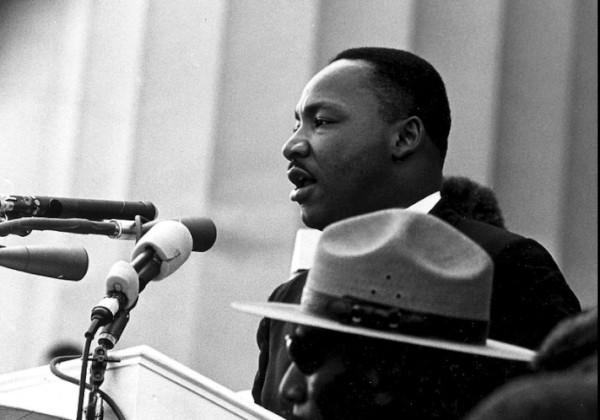
HC Inks Deal with MLK Jr. Archives
By Rachel Deahl | Jun 23, 2021In an agreement with the estate of Dr. Martin Luther King, Jr., HarperCollins has acquired world publishing rights to the archives of the civil rights leader. The publisher said the collection features some of the "most historically important and vital literature in American history."
Judith Curr, president and publisher of HarperOne Group, negotiated the deal with Amy Berkower, president, Writers House and agent for the King estate; and Eric D. Tidwell of Intellectual Properties Management, manager of the King estate. The deal gives HC world rights to publish new books from the archives across all formats, including children’s books, e-books, audiobooks, journals, and graphic novels in all languages.
HC said it plans to hire an archivist who will oversee the material in the archive and make it "available to all HarperCollins editors globally." HC added that it intends to "engage prominent Black scholars, actors, artists, performers, and social activists to help bring Dr. King’s works to life."HC also has history with King. A predecessor company to HC, Harper & Brothers, published King's first book, Stride Toward Freedom: The Montgomery Story, in 1958.
All current his King titles, including those published by Beacon Press, will continue to be publishing by their current rights holders.
“We are thrilled to be the official publisher of Dr. Martin Luther King Jr.’s archives,” said Curr in a statement. “We view this as a unique global publishing program."
The first King titles to be published by HC are scheduled to drop in January 2022, coinciding with Martin Luther King Jr. Day.
SOURCE ARTICLE
Kobo Emerging Writer Prize, Books for Palestine, and an Intro to Booktok: This Week in Book News
https://kobowritinglife.com/2021/06/25/kobo-emerging-writer-prize-books-for-palestine-and-an-intro-to-booktok-this-week-in-book-news/
-


Following Naver's $600 million acquisition of Wattpad earlier this year, Wattpad and Naver's Webtoon are merging their film and television production studios under the name Wattpad Webtoon Studios. Aron Levitz, who previously oversaw Wattpad Studios, will serve as president of combined group.
"One of the best things about Wattpad Webtoon Studios is that we’re format agnostic, we have incredible IP with built-in fans in every genre, and stories that already travel across borders," said Ashleigh Gardner, deputy general manager for publishing of Wattpad Webtoon Studios. "We have access to some of the biggest libraries of stories and digital comics on the planet, with stories in every genre you can imagine."
Naver is supporting the new studio with an investment of $100 million in content development and production financing. The studio will use data to determine the most popular stories and attempt to ascertain their potential for success in the broader marketplace as TV shows, films or books.
"This commitment reflects Naver’s confidence in our team’s ability to create incredible books and industry-leading entertainment that fans will love in any format," Gardner said, adding that the formation of the studio and investment will enable Wattpad to move faster, to adapt stories for new formats and audiences.
-

OverDrive to Acquire Kanopy
June 9, 2021
2021, PRESS RELEASES
OverDrive Library and College Partners to Benefit from Kanopy’s Acclaimed Video Catalog, Platform and Apps
CLEVELAND – June 9, 2021 – OverDrive, the leading digital reading platform for libraries and schools worldwide, announced today that it is acquiring Kanopy, a leading video streaming service for public and academic libraries.
OverDrive to Acquire Kanopy - OverDrive
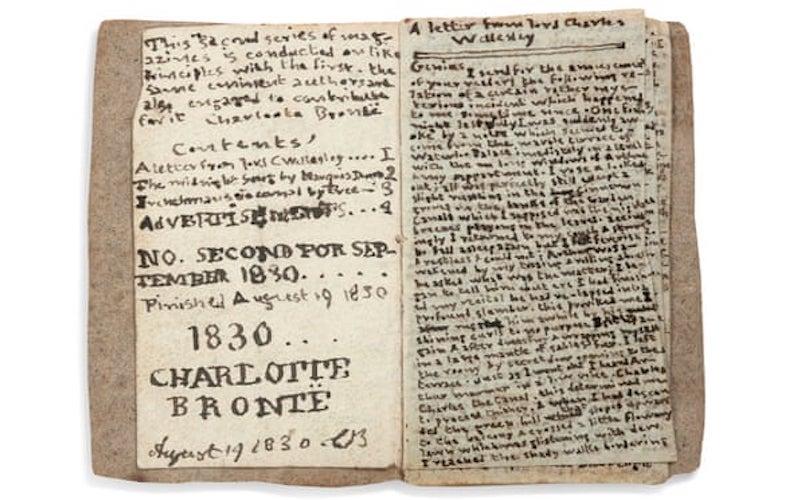
Brontë enthusiasts have banded together to stop Sotheby’s from auctioning off rare manuscripts.
By Walker Caplan
June 22, 2021, 1:37pm
Last month, Sotheby’s announced that a collection of rare Brontë-affiliated manuscripts, most notably a volume of 31 handwritten poems by Emily Brontë, was slated for auction along with other manuscripts by Robert Burns and Walter Scott. Now, Sotheby’s has agreed to delay their auction, as a group of British libraries and museums have announced their attempt to purchase and preserve the collection for the public. The time frame of the auction delay has not been publicly announced.
The aforementioned manuscripts are all part of a private library, the Honresfield Library, collected and kept in the 1800s by Alfred and William Law; after Alfred’s nephew, inheritor of the library, died, the collection disappeared from public view and was thought to be lost to the ages.
-

BEFORE YOU READ THE ARTICLE BELOW, I have a question
Where are the publishers for thoughts from non white communities in the usa, that are negatively biased toward others?
THE GREAT RIGHT-WING PUBLISHING DIVIDE WIDENS
Mike Pence and Jared Kushner are writing for establishment players, as Mark Meadows and Peter Navarro head to a conservative upstart. So where does Donald Trump end up?
BY CALEB ECARMA
JUNE 17, 2021
Right-wing authors struggling to ink book deals—like Missouri senator Josh Hawley, whose deal with Simon & Schuster was nixed after he seemingly cheered on the January Capitol riot—can take heart: A pair of conservative publishing executives have united to bring them hope. Louise Burke, a former top publisher at Simon & Schuster, and Kate Hartson, the former editorial director at Hachette Book Group’s Center Street imprint, are launching All Seasons Press, a company that, by its own definition, is “open to welcoming those authors who are being attacked, bullied, banned from social media, and, in some cases, outright rejected by politically correct publishers.”
Uproar over right-wing figures’ publishing deals has come to a head of late. In April, about 14% of Simon & Schuster employees signed a petition calling for Mike Pence’s book deal to be dropped, saying that publishing the former vice president amounted to “legitimizing bigotry.” (Simon & Schuster CEO Jonathan Karp ultimately ignored the petition request, writing in a letter to staff: “We come to work each day to publish, not cancel, which is the most extreme decision a publisher can make.”) Burke told the Wall Street Journal that she is “increasingly concerned and somewhat outraged about what’s going on in terms of free speech and free press” and fears the “canceling of voices that…are meeting resistance from mainstream publishers, particularly former [Donald] Trump administration members.”
While Burke noted that there is already “competition” in the conservative publishing industry, which includes Regnery and Random House’s Crown Forum imprint, she still believes there’s “room for another publisher, especially one that will be as independent as we are.”
Already, All Seasons Press has illuminated an interesting dividing line in terms of the Trumpers it plans to publish. There are those like former Trump chief of staff Mark Meadows, former White House adviser Peter Navarro, and ex-Rush Limbaugh producer James Golden who have migrated to the publisher, according to the Journal. (Hawley, for his part, found an alternative publisher in Regnery.) In an email to the outlet, Navarro claimed the publishing world has “devolved into a Cancel Culture, Virtue Signaling cesspool,” adding, “it is refreshing to see a new publishing house emerge willing to print books such as my forthcoming volume in the Fall that will speak truth to power.” Then there are those like Pence and Jared Kushner, whose deal with Broadside Books, an imprint of HarperCollins, was announced this week—the names so recognizable that publishers have seemingly calculated that the headache of printing their work is, financially speaking, worth the hassle of potential blowback.
Still up in the air is Donald Trump himself. The former president claims he is “writing like crazy,” working on a memoir of his time in office. He also claims he’s rejected offers from two unnamed major publishing houses. But sources at Penguin Random House, Hachette Book Group, HarperCollins, Macmillan Publishers, and Simon & Schuster—the Big Five publishers—recently told Politico they were unaware of any such offers. The outlet also reported that publishing executives are concerned that signing a deal with Trump could result in a staff uprising and other signed authors walking out in protest.
Books about Trump and his presidency, however, are still in demand. Michael Wolff’s Landslide: The Final Days of the Trump Presidency will be released on July 27, and Wolff said on Twitter that an excerpt of the book will appear in a New York magazine cover story on July 5. The book’s publisher, Henry Holt and Company, described it thusly: “In Landslide, Wolff closes the story of Trump’s four years in office and his tumultuous last months at the helm of the country, based on Wolff’s extraordinary access to White House aides and to the former president himself.”
The Great Right-Wing Publishing Divide Widens | Vanity Fair
-
-
Hideaki Anno's "Return of Ultraman" (Eng Subs)
Hideaki Anno's 1983 college parody film of Ultraman, as part of Daicon films. Be sure to turn on the English subtitles!
Hideaki Anno is the creator of Evangelion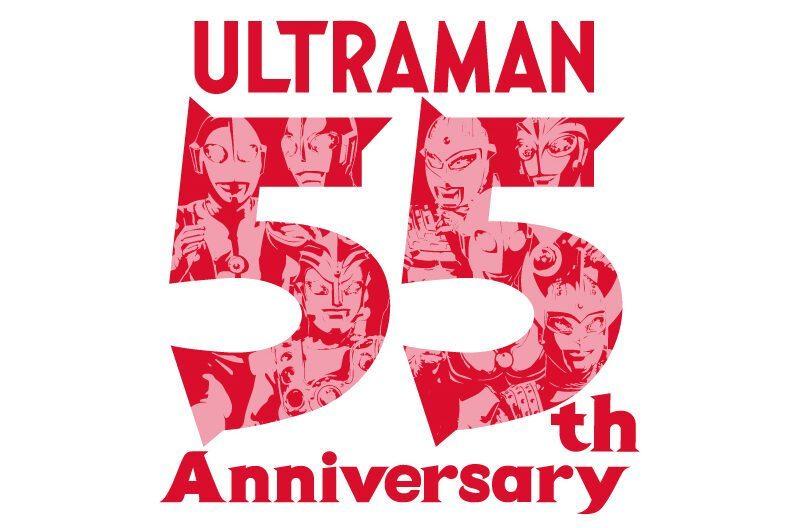
-
My , Artist be like, three panel comic
https://www.deviantart.com/hddeviant/art/My-Artists-be-like-886143892Spider man tutorial
https://www.deviantart.com/hddeviant/art/My-Tutorial-Spider-man-886143284 -
Sunday Business Sermon: Negotiation (Ask for More)Jane has been negotiating contracts as an editor and freelancer for 15 years. She shares easy-to-apply tips and questions for your next negotiation, plus explains the basics of how book and magazine contracts work.
-
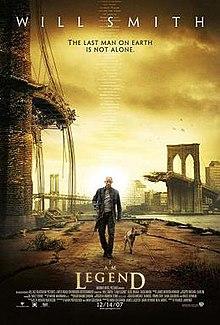
THE PROBLEM HUMANITY HAS WITH RICHARD MATHESON'S "I AM LEGEND"
To be honest, the video poster below has flaws. I read "I am legend". MAtheson in the video said the real problem and I amend it is with most of the movies; said problem is, it isn't his story.
The last man on earthThe Omega manThe potential Arnold swartzenegger I am legendWill smith's I am legendOf those films only the last man of earth actually resembles anything to MAtheson's story. The question is, what is matheson's story? the cheap reader thinks the story is about Neville. the wise reader knows the story is about humanity. Matheson's story post a simple question. What if a Virus kills or makes extremely sick all of modern humanity save one. Modern humanities technology fails to undue the affects from the virus . Modern humanities technology fails to stop the deaths from the virus. One human being is left alone amidst two other human being types, the dead or the infected.Charlton Heston/Arnold Swrzenegeer/Will Smith saw in the story, idolatry to the individual, perseverance to modern humanity. But the truth is, Neville for all of this loneliness has one great flaw. He is convinced humanity is doomed. He is convinced humanity will die. He sees himself as the last man. The loneliness /his culture/the human society he was born or raised in can't comprehend the simple truth. Humanity survived. A fourth type of human exists in the book, slowly growing in number. The civilized. Neville, the dead, the insanely infected, the civilized carriers, are the four human being types at the end. And Neville who has become completely uncivilized through years or loneliness plus deadly habit plus negative culture he was raised in, can not exists side the civilized carriers. Moreover he is feared by the civilized carriers, plausibly. I will restate but I will go to the three films that miss this. HEston's film like Will smiths negate the idea, the primary concept, that Neville is the last human like myself. Sequentially, the big failing in telling the story from the book. A main plot point is that modern human society failed, completely. It tried, it worked hard, and it failed. BUT, Nature is greater than human technology, I didn't say GOD , I said Nature, and humanity as a child of nature adapted through natural means. I imagine ridley scott wanted swrazenegger to be killed by the victorious vampire-esque infected people. A somber thought that the studios did not like. But, scott or the studios have it wrong. Humanity survived. You see, one of the problems with human beings and the idea of apocalypse is the myth that if humanities technology fails, all is doomed. but all isn't. Women , even infected with various ailments, have children. Some people will act undifferent while carrying a virus that will make others incomprehensible. NEville is so convinced as is most of the producers of the films that humanity is finished when technology fails against a virus that they forget humanity is very old. A virus can kill many, most, but no virus ever killed all humans. No virus has ever killed the entirety of humanity and after every single viral spread the humans who lived... lived... that is what I am legend is about. It is a creation story told from the angle of the last person from the old community. In my mind I can see Obatala/Zeus/Amatarasu/Quetzecoatl as human beings from an old community that are legends that have been given godhood, a controller of nature, a very human mental construct. Matheson could had told the story from the angle of Ruth, who is a child born from the infected who is infected herself but can live with the virus. But he didn't want that, the trick of the story , is we are getting the creation story from the angle of the last of the old community, the one who is legend. ... One of the finest lines in the book, is when NEville asks ruth , to guide the future humanity, don't let them make the same mistakes. NEville comprehends the technology he needed to change, to improve, was his culture. Culture is what you want to grow. He realize at the end, his heritage, what you carry was the technology that was lacking. Not, epidemiology or biology or the scientific method. His culture. His ability to accept change he can not control or escape from or immigrate from. Change that will destroy the community , the humanity he knows. A culture that can accept that a new humanity will exists, it will survive through what the old could not. And lastly, NEville realized what all the movies, including even, the last man on earth, fail to show. NEville had a chance to teach, he had a chance to guide the new humanity but he was busy being angry at the death of the old community that he is the last representative of, angry that he was alone, angry that no one else shared his similar experiences, that he spent all that time killing or hunting or treating the coming new human community as villains, merely for living with a virus, overcoming the failing from the virus, he hated.IN AMENDMENTMany humans last year, 2020 , and many humans this year, 2021, are just like Robert Neville. From the beginning, I said everything will be alright last year. Not cause I am a mental expert or am wise but cause I think toward the uncomfortable sometimes. I have learned to that through experience. But most people were not communicating that experience. They were having the same inner monologues NEville had. Communicating the same fears NEville had.My grand mother died, my grandfather died, my mom died, my father died, my wife died, my husband died, my daughter died, my son died,my granddaughter died, my grandfather died, the stores went out of business, I lost my job, I'm scared! we need a vaccine, we need social distancing, we need masks, we need remote learning, we need remote labor, we need government assistance, we need the businesses to reopen, we need global trade to begin again, people who don't act like me are stupid, people who don't act like me are traitors, people who don't act like me are murderers, people who don't act like me are dangerous... all of that talk is Neville speak. Neville is preoccupied with who has died, what vaccine or scientific assessment or tools he can derive, how different the infected act compared to him. NEville has no thought that everything is alright. NEville can't simply live his life peacefully, calmly, unafraid. Why can't neville accept that if he can live with the virus absent masks, absent vaccines, absent anything even companionship, that maybe others can too, that maybe humanity can. The lesson in the story is what hollywood is too afraid to tell. what most in the paying audience, which is not most in humanity, are afraid to see. What if human technology or human communities all over the earth fail completely and humanity survives and thrives? -
Swing!
by Oscar MicheauxPublication date 1938
Usage Public Domain Mark 1.0Creative Commons Licensepublicdomain
Topics race film, independent, backstage musical, melodrama,
Publisher Micheaux Film
Language English
Mandy Jenkins, an African American cook for a wealthy white family in Birmingham, Alabama, discovers her husband Cornell is having an affair with Eloise Jackson. When she confronts her husband and Eloise at a nightclub, a violent fight ensues. Eloise leaves Birmingham and relocates to Harlem, getting a job as a cabaret vocalist under the stage name Cora Smith. She is followed to Harlem by her husband, Lem, who gets mixed up in the local crime scene. Mandy also arrives in New York, having left Cornell. She gets a job as the wardrobe mistress at the cabaret where Eloise is performing. When Eloise breaks her leg during a drunken fall, Mandy is recruited as a last-minute substitute. (Adapted from Wikipedia.)This film was released without copyright notice, nor was it ever registered with the copyright office. Thus, it is and always has been in the public domain.
Complete version
https://ia800603.us.archive.org/34/items/swing-1938/Swing.ogv
Incomplete
-
Well... it is another Friday, another day to love, to Oxum, Oshun, Freya, or Venus, another day to Kizomba!
I saw a few wedding kizomba's before , posted one, and I will be blunt; they were not the most romantic; this Kizomba was choreographed from Dennis PaSamba. -
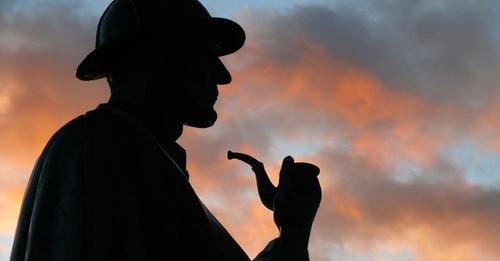
Are Fictional Characters Protected Under Copyright Law?
July 14, 2021 by Kathryn GoldmanToday’s post is from intellectual property attorney Kathryn Goldman (@KathrynGoldman) of the Creative Law Center.
Jack Ryan, the analytical, yet charming CIA analyst, made an appearance in federal court in Maryland earlier this year. The heirs to Tom Clancy’s literary legacy are fighting over him. Unlike in the movies, he’s not in a great position to fight back.
It all started when Clancy signed the publishing deal for The Hunt for Red October where Jack Ryan made his debut in 1984. In a departure from common practice, Clancy transferred his copyright in Red October to the publisher. A few years later, Clancy realized his mistake and was able to negotiate return of the copyright for the book. He immediately transferred the reverted copyright to his company.
Here’s the crux of the current court battle: When Clancy mistakenly transferred his copyright in the book Red October to the original publisher, did the copyright to the character Jack Ryan go with it? Or did Clancy retain the character copyright? In normal practice, the sale of the right to publish a copyrighted story does not stop the author from using its characters in future works.
If Clancy retained the rights to the character when he signed the initial publishing contract, then the rights that reverted from the publisher would not have included the copyright for the character. The reverted rights Clancy turned around and transferred into his company would not have included the character rights. All of which means that the character, Jack Ryan, is part of Clancy’s estate and not controlled by the company he set up.
Jack Ryan is a valuable character with his own copyright separate from the copyright in the book. Everybody concerned, the owners of the company and the heirs to the estate, wants a piece of him, or all of him. And it’s not clear where Mr. Ryan currently resides.
Fictional characters are not listed in the copyright statute as a separate class of protectable work. There’s no application at the Copyright Office for them. But over the years, the law on character protection has evolved.
Courts have held, in certain circumstances, that fictional characters are protectable in their own right.
This is important because characters with independent copyright can be licensed separately from the stories in which they originally appeared. It’s another way for authors to divide their rights to create multiple income streams. That’s the beauty of copyright. It’s divisible. An author can keep some rights and license others. It’s what Clancy did and his company/estate is still doing with the Jack Ryan franchise.
Not every character can be protected by copyright. Stock characters cannot be protected—a drunken old bum, a slippery snake oil salesman, a hooker with a heart of gold, a wicked stepmother, a gypsy fortune teller, and so on. They are essentially ideas for characters, vague and lightly sketched. Copyright does not give anyone a monopoly on ideas. Protecting stock characters would prevent as yet untold stories from being told. Depriving the world of new stories is exactly the opposite of what copyright is intended to promote—the creation of more stories, more art.
A character must be well delineated to be protected.
It must have consistent and identifiable character traits and attributes so it is recognizable wherever it appears. Think James Bond and his distinctive character traits: his cool demeanor; his overt sexuality; his love of martinis “shaken, not stirred”; his marksmanship; his “license to kill”; his physical strength; and his sophistication. Bond is protected by copyright. The Bond character is identifiable regardless of who depicts him.Defining the well-delineated character can be difficult. Characters that are central to a story tend to change. They evolve. They are built up throughout the book until they are fully formed in the mind of the reader. Without character transformation there is no hero’s journey, no story. Characters can become more delineated and more protectable over the course of a series of books. Bond developed over the course of 14 books written by Ian Fleming and continues to develop on film.
Characters that are less developed are less likely to be protected. Those characters are less expression and more idea. There’s a gray area that needs to be navigated when balancing the protection for original characters but leaving character ideas in the public domain free for all to use.
Public domain characters cannot be protected
But new characters created from public domain works can be protected. Consider Enola Holmes, the younger sister of Sherlock. The Sherlock Holmes stories have been slipping into the public domain for years now, to the chagrin of the estate of Arthur Conan Doyle. The creative elements of Sherlock Holmes stories that are in the public domain can be used by others to build new stories.Enola Holmes was introduced to readers in a series of young adult books written by Nancy Springer. Enola does not exist in the Conan Doyle canon; she was created by Springer. She has distinctive traits (high intelligence, keen observational skills and insight, skills in archery, fencing, and martial arts, an independent thinker who defies Victorian norms for women) that combine to make her well delineated and protectable.
Another wrinkle: “The story being told” test
The “well delineated character” is the most widely accepted legal test used to decide whether a fictional character is protected by copyright, but it is not the only one. The other is “the story being told” test. Sam Spade is responsible for this test.Dashiell Hammett created Sam Spade when he wrote The Maltese Falcon. Hammett licensed the exclusive rights to use the book in movies, radio, and television to Warner Brothers. Hammett later wrote other stories with Sam Spade. Warner Bros. complained that it owned exclusive rights to the character and Hammett couldn’t write about him anymore.
Ironically, the court protected Hammett’s right as the creator to use Sam Spade in future stories by deciding that the character was not protected by copyright. Sam Spade is just a vehicle for telling the story and is not the story itself. He is the chessman in the game of telling the story. It was the story that was licensed to Warner Bros., not the chessman.
A character is protected under the “story being told” test when he dominates the story in a way that there would be no story without him. This test sets a high bar for character protection. To protect the character, the story would essentially have to be a character study. The Maltese Falcon is not a character study of Sam Spade.
An example of character protection using the “story being told test” is the Rocky franchise. A screenwriter wrote a story on spec using the characters Rocky, Adrian, Apollo Creed, and Paulie. The work was considered to be an infringing use of the characters. The characters were protected because the movies focused on the characters and their relationships, not on intricate plot or story lines. The characters were the story being told. The writer could not avoid the infringement touchpoint of substantial similarity when he took the characters and used them in a new storyline.
In summary
Fictional characters can lead a new and independent life completely separate from the original work in which they appear. They are an additional creative asset in a writer’s intellectual property portfolio. There is no straight forward way to register for character protection with the Copyright Office other than as part of the larger work. Authors will be well served to think about protecting the rights in their characters when signing publishing contracts and licensing agreements.Kathryn Goldman
Kathryn Goldman is an intellectual property attorney and Editor-in-Chief at the Creative Law Center. She represents, writes for, and teaches creatives and entrepreneurs about copyright and content protection, trademark basics and branding, and business building. She can be reached at Kathryn@creativelawcenter.com.ARTICLE LINK
https://www.janefriedman.com/are-fictional-characters-protected-under-copyright-law/COMMENTS IN ARTICLE
Fan fiction is a hot button for many professional writers. Broadly speaking, if the fan fiction is written by a non-professional and is non-commercial then it is more likely to be considered fair use, an exception to infringement. However, even if the work is not professional and not commercial, many writers consider fan fiction an infringement.
My purpose in writing this post is to make writers aware that their characters can have individual protections. It is a concept that should be considered when licensing the work, in an option agreement for instance. I have seen requests from producers to option not just the work, but certain characters in the work. Writers need to consider how they want to deal with those requests when they come. You do not need a multi-million dollar franchise to start thinking about it.I will say one thing first, lawyers always reveal the most interesting legal battles in various subjects. I knew of none of these incidents. Thank you Ms/Mrs Goldman and as always thank you Jane Friedman for sharing.
I admit I wanted to have my first fan fiction this year and I failed. I like to create something I never did before each year. But this article made me realize I made two errors.
My first error was my inability to make a fan fiction. I am an original creator and every time I tried i kept making a world or characters that have no plot connection to the source fiction or characters. Imagine a story supposed to be set in the same world as harry potter but is primarily concerned with a magical detective agency in calcutta during the mughal era where the magicians don't use wands and the plot never goes to europe or the usa or mentions any spells in harry potter or any of the references of the movies or books. Is that fan fiction? or merely fiction that a writer has to say is based in the harry potter world?
But after this article, I made a second. I didn't put enough thought into the whole activity of fan fiction, especially to work that is not in a public domain. I am glad I failed to continue the use of the world or characters in the material I wanted to make fan fiction for. I still will like to try it. but I will start with a better dialog with the author. that is first
COMMENT ON FACEBOOK POST
Wiley Saichek
Jane Friedman My client Chelsea Quinn Yarbro (we ran an excerpt from her book on writing a few years ago) is one of those writers who are extremely protective of her characters and does not grant anyone the usage of her characters in fan fiction, even in amateur publications, not for profit outlets. From her point of view and her lawyers at the times, distribution is a key factor, not whether the infringing fan writer makes any money off of it.
My personal suggestion is if anyone wants to use a character they did not create, ask the copyright holder's permission and respect their decision. I.e. Quinn has written stories in the Holmes universe but got permission from the estate and had rules to follow.
Quinn's most serious case of infringement happened in the 1990s, she wrote two essays about it in a SF publication in 1992. In her case she was asked and said no, and the fan writer wrote it anyway and it ran in a fanzine with a note acknowledging CQY declined permission but they were going to run it anyway and hope she will forgive them. I think they actually used three of her recurring characters.
Many fans and writers disagree with how she handled it, but she has zero sense of humor about it. -
Animal BFF
The image above is the submission
Title: Wantagh's Cat
I hear on the beach the following whisperings
Asunal Oolihkmbuyal
Asunal Wiipongweewal
Wantagh NzuksewI made a graphite drawing, developed a poem based on that drawing, and then an ink and then colored the ink. I wanted to use the indigenous language of NYC which is Muscee, of the original inhabitants of NYC, where we get the words Manhattan, Wantagh, Montauk from.
I do not know Muscee and I can not confirm what I read is correct. But from what I comprehend of Muscee, I translated the following into Muscee
The Waters are Blue
The Rocks are Grey
Wantagh is BlackSUBMISSION
https://www.deviantart.com/hddeviant/art/Animal-Best-Friend-Forever-Submission-885747866
ORIGINAL INK
https://www.deviantart.com/hddeviant/art/Animal-Best-Friend-Forever-Original-INK-885748190
ORIGINAL GRAPHITE
https://www.deviantart.com/hddeviant/art/Animal-Best-Friend-Forever-Source-Graphite-885748474I learned the Muscee from the website the following webpage is a part of
http://www.native-languages.org/munsee.htm -
James Baldwin’s Advice on Writing
BY MARIA POPOVAIn 1989, Paris Review founding editor and trailblazing interviewer George Plimpton edited a wonderful collection titled The Writer’s Chapbook: A Compendium of Fact, Opinion, Wit, and Advice from the 20th Century’s Preeminent Writers (public library) < https://www.worldcat.org/title/writers-chapbook-a-compendium-of-fact-opinion-wit-and-advice-from-the-20th-centurys-preeminent-writers/oclc/19130744&referer=brief_results > . Among them was novelist, poet, essayist, and playwright James Baldwin (August 2, 1924–December 1, 1987), whom Plimpton had interviewed on two separate occasions in early 1984, half a century after Baldwin read his way out of Harlem < https://www.brainpickings.org/2015/04/10/a-rap-on-race-james-baldwin-reading/ > and into the pantheon of literary greatness.
In a fantastic addition to the collected wisdom of celebrated writers, Baldwin looks back on his formidable career and shares what he has learned about the creative process, the psychological drivers of writing, and the habits of mind one must cultivate in order to excel at the craft.
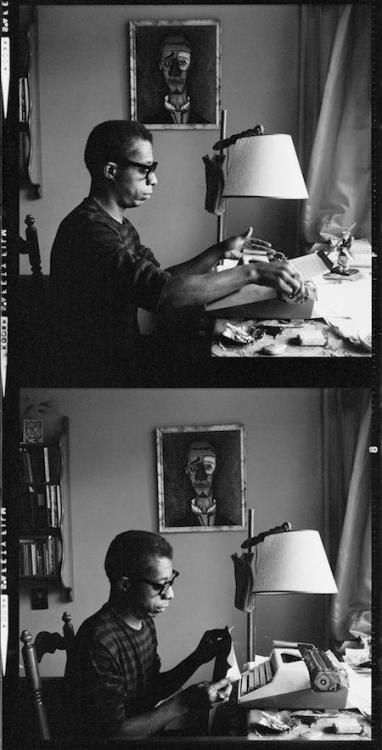
Reflecting on what motivates great writers to write — an enduring question also addressed beautifully by George Orwell, David Foster Wallace, Italo Calvino, and William Faulkner — Baldwin sides with Bukowski and argues that the supreme animating force of the writer is the irrepressible impossibility of not-writing:"Something that irritates you and won’t let you go. That’s the anguish of it. Do this book, or die. You have to go through that. Talent is insignificant. I know a lot of talented ruins. Beyond talent lie all the usual words: discipline, love, luck, but most of all, endurance."
Endurance, indeed, is perhaps the sole common denominator among successful authors. Any aspiring writer, he admonishes, should have no illusion about the endurance required but should want to write anyway. A generation after Jack Kerouac considered the vital difference between talent and genius, Baldwin notes:
"If you are going to be a writer there is nothing I can say to stop you; if you’re not going to be a writer nothing I can say will help you. What you really need at the beginning is somebody to let you know that the effort is real."
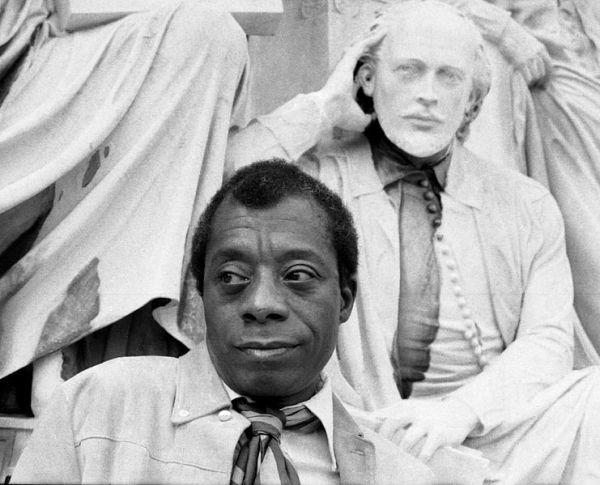
In a sentiment reminiscent of Joan Didion’s observation that she writes in order to gain better access to her own mind, Baldwin speaks to the consciousness-clarifying function of the creative impulse:
"When you’re writing, you’re trying to find out something which you don’t know. The whole language of writing for me is finding out what you don’t want to know, what you don’t want to find out. But something forces you to anyway."
Much of that self-revelation, Baldwin points out, happens not during the first outpour of writing but during the grueling process of rewriting. Echoing Hemingway’s abiding wisdom on the crucial art of revision, he adds:
"Rewriting [is] very painful. You know it’s finished when you can’t do anything more to it, though it’s never exactly the way you want it… The hardest thing in the world is simplicity. And the most fearful thing, too. You have to strip yourself of all your disguises, some of which you didn’t know you had. You want to write a sentence as clean as a bone. That is the goal."
But as essential as that sense of incompleteness may be in guiding the revision process, it must be mediated by the awareness that completeness is a perennial mirage. (Decades later, Zadie Smith would observe in her ten rules of writing: “Resign yourself to the lifelong sadness that comes from never being satisfied.”) Baldwin offers:
"When you’ve finished a novel, it means, “The train stops here, you have to get off here.” You never get the book you wanted, you settle for the book you get. I’ve always felt that when a book ended there was something I didn’t see, and usually when I remark the discovery it’s too late to do anything about it."
Adding to the endlessly fascinating daily rhythms of great writers, which reflect the wide range of differences in the cognitive conditions of the ideal writing routine, Baldwin shares his work habits:
"I start working when everyone has gone to bed. I’ve had to do that ever since I was young — I had to wait until the kids were asleep. And then I was working at various jobs during the day. I’ve always had to write at night. But now that I’m established I do it because I’m alone at night."
Complement The Writer’s Chapbook — a treasure so wisdom-packed that it is a tragedy to see it fall out of print — with Joseph Conrad on what makes a great writer, Willa Cather on the life-changing advice that made her a writer, and Jane Kenyon on what remains the finest ethos to write and live by, then revisit Baldwin on the artist’s role in society < https://www.brainpickings.org/2014/08/20/james-baldwin-the-creative-process/ > and his terrifically timely conversation with Margaret Mead about race and identity. < https://www.brainpickings.org/2015/03/19/a-rap-on-race-margaret-mead-and-james-baldwin/ > Public Library Link < https://www.worldcat.org/title/rap-on-race/oclc/140398&referer=brief_results >
ARTICLE
https://www.brainpickings.org/2016/02/08/james-baldwin-advice-on-writing/ -
Well... it is another Friday, another day to love, to Oxum, Oshun, Freya, or Venus, another day to Kizomba!
Laurent and Adeline are very artistic, of all my favorite dancers they are the ones who tend to fuse more dances into their kizomba routines. This routine is really for the lovers. This is worth doing in a club but not from two leisurely; this routine is for a couple who want to be in their own world on the dance floor. See and comprehend -

The Chinese Communist government is 100 years old, western european christian calendar, this year. If you cut out governments in humanity that are not white european, which includes the USA/all of Europe which includes Russia/australia/south africa/all the countries of central or south america/mexico/canada by my assessment, where does China rank among the remaining countries? I say 1st. What say you?
When you look at China's government, it isn't multiracial from a regional perspective, it is han chinese, it isn't welcoming to the foreigner or immigrant or other people native to china like the ugyars, muslims can come in china but no mosques are being built, latinos can come to china but no barrios or enclaves of another language. China is successful , lets be honest, but it didn't reach success by miscegenation or integration with others or in itself.
When I look at black countries, whether in Africa or the Caribbean, and how they can improve... When I look at Black communities in Asia/Africa/the Americas/Europe and I think on how they can improve themselves even if they have a dominant white neighbor... I say to myself, how can the example of china be ignored. The truth is, the global community as a whole or in parts does the opposite. The leadership of the global black community in counties or communities chastize those in it who dislike the stranger. The strong institutions like the religious ones in the black community in any country welcome white patronage often while chagrin black empowerment that rejects white association. Nigeria is a country that boast many college educated people in the sciences, but Nigeria does not have an industrial base like china.
What are your thoughts?
-

Someone asked a question
I totally get what you are saying but didn't China have tens of millions of deaths because of communist rule?
My reply in total truth is the following
You ask a question that warrants one beforehand. what is the role of a government in the atrocities under its roof? Your question assumes a government is to blame. But is that true? Is the fiscal capitalist rule of the USA to blame for the annihilation of native american peoples or the near annihilation of indigenous peoples, like the Ute in washington state or the native hawaiian in hawaii? OR is it the majority in the USA, the commonly called white community , that is to blame for the annihilation of the indigenous or the enslavement of the black? is it the majority in china, the han chinese ,who are to blame for the assault on non han chinese in china? Is it the british government to blame for the troubles in ireland, or is it the english people? Is the russian government to blame for chechnya or is the nordic rus? Most countries, over 90% , in humanity have a majority populace. That majority populace forms or controls the government and uses the government to abuse minority populaces. Now some exceptions do exist, most are in africa. South africa is still run by its minority white populace. Over the years they have used a section of the black majority populace to maintain power but that arrangement is rife with current and future chaos. Nigeria has a standoff society. The Yoruba dominate government. Tha Hausa dominate the military. The Igbo are where the oil sits. while each group have a 3rd of the populace. So no group has a true majority and thus chaos. Government is a thing that governs. The problem with your original question is , it assumes a government is meant to be an engine for equality among the peoples who live under it. But that is a false assumption. The only way equality comes is when the people themselves want it, ala why the USA has many people in it that are confused today. They can not comprehend, cause they were lied to in their rearing, how people in the usa can still dislike the individual stranger in a country that has men/women/black/white/indigenous/christian/muslim/lgbtq+ millionaires/billionaires/elected officials/college professors... the usa has the most multicultural community under its government with a history of success from individuals of all walks of life, and more interracial mixing than any other populace under a government , and yet, communities still hate each other, undermine each other, discard the individual mandate. But the why is simple. It is a lie to think biases can be disproven. Biases do not come based on proof, they come based on desire. White people did not enslave blacks based on inhumanity in blacks or whites. Blacks are human, not subhuman. Whites are human, not devils. Whites people enslaved blacks based on a desire to make money or feel superior. Black people becoming scientist or presidents, doesn't change that desire. In the same way, blacks becoming college professors or mayors doesn't change the desire of blacks to kill whites for slavery. So, majorities under any government compose/control a government and they abuse minorities. Sometimes they may make allowances, but that is not equality to a minority, that is merely a pausing to an eventual larger problem down the road. And, majorities like to abuse minorities for what they can gain. Regardless of advertising, merited actions can from minorities does not delete the desires of majorities, and history proves me right more than anything.
-

Someone asked a question
Wouldn't that depend on who holds the power? In China I like thought that only a fraction of the people there are actually associated with the CCP.
My reply in total truth is the followingWell, my point was that majority rules in most countries. The majority community in most countries dictates the government. In the USA that is the commonly called white community. In china that is the commonly called Han CHinese. Minorities in very few instances in modern humanity control the government, or hold the power. South africa is an example . Now describe association? how many people in the usa are associated with the two main parties of governance? yes people vote in elections, but how many people have an intimate knowledge or relationship to the local branch of either party in the city where they live? I know in nyc, most people have no clue about either party in their region in nyc. So, the relationship of the common people of china to the chinese communist party is relative based on how you define associated?
-
-
Hill Harper Launches First Black-Owned Digital Wallet And Cryptocurrency Exchange App In U.S. History
from Njera Perkins < https://www.linkedin.com/in/njera-perkins >
Famed actor Hill Harper is getting into the money game by way of financial technology that’s powering a newly-launched digital wallet for investors of color.According to a press release, Harper announced the launch of The Black Wall Street app just in time for Financial Literacy Month as a means to empower Black and Latinx investors and contribute to closing the racial wealth gap in America. This feat marks the first-ever Black-owned digital wallet and cryptocurrency exchange platform to exist in the U.S.
Through this digital fintech platform, Harper hopes to create the world’s largest investment and financial literacy curriculum/toolkit for communities of color to use across the diaspora.
“Our technology seeks to replicate the brick and mortar Black Wall Street, as a digital ecosystem that will galvanize the financially excluded and directly stimulate the economic growth and spending in marginalized communities everywhere,” Harper shares in a statement. “With the Black Wall Street technology, we seek to make obsolete payday lenders and other financial predators plaguing our communities, while simultaneously creating cross generational wealth transfer, for people who have historically been taught to work for our wages instead of making our wages work for us…because Black Cash Matters.”
The Black Wall Street app is both named after and inspired by the legacy of the Greenwood district in Tulsa, Oklahoma that was once considered the epicenter of thriving Black businesses.
Next month, the new digital platform will acknowledge the 100-year anniversary of the 1921 Tulsa Race Massacre with a monumental, 30-market financial literacy campaign and bus tour starting in Los Angeles, CA and ending on Greenwood Avenue in Tulsa, OK from May 31 to June 1.
The tour will visit some of the most disenfranchised communities across the country and introduce financial literacy as well as cryptocurrency in an effort to celebrate the Greenwood legacy, which is considered the most successful Black economic community in U.S. history.
“What the Black Wall Street was in Tulsa and the Greenwood district is just very empowering,” Harper told CNBC. “There were three pillars that created the wealth that was created in the Black Wall Street [in Tulsa],” he notes with the first two being institutional ownership and institutional trust by the community.
“Pillar number three was the movement of money or capital within the ecosystem where dollars changed hands 60 to 100 times within a year before it left that Black community,” he adds.
The Black Wall Street’s Crypto-curriculum and DigitalWallet campaigns will be led by Harper in partnership with world-leading cryptocurrency exchange expert, Najah Roberts.
The ultimate goal of The Black Wall Street is to offer Black and Brown communities a fighting chance to get involved in the transfer of wealth through cryptocurrency and decentralized finance.
The time for communities of color to regain their financial independence is now and Harper hopes to use his new platform to pave the way for better financial futures for generations to come.
For more information about The Black Wall Street, visit its website. < https://theblackwallstreet.com/ >
-
July Dates
4th - Mercury greatest elongation 22 degrees
5th- Aphelion Story Story Moon at Apogee - the earth will be farthest from the sun while the earth will be farthest from the moon
6th Louis Armstrong spirit flew 1971
9th Moon highest over equator while a new moon
10th his masters voice trademarkers 1900
15th Rembrandt born 1606
16th Giuseppe Piazzi born 1746
20th British colombia joined canada 1871
21st Robert Burns died 1796
22nd Saint Mary Magdalene Story
25th national cowboy day Story
28th Beatrix Potter born 1866
30th Apollo 15 landed on moon
31st Viking 1 took face on mars photo 1976
If you are interested you can Vote for #37

https://www.deviantart.com/sylessae/journal/Sylessae-DTIYS-Community-Voting-884590493
-
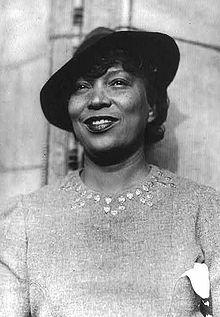
In my experience, less than ten percent of the black writers I have talked to throughout my lifetime have read or written a screenplay. The question is why?
I do not know exactly, I can not give a roadmap but I have ideas.
I will go back... when I was a kid, multiple times my parents took me to see plays. August Wilson, Black theaters around harlem. They never took me to see a white play, defined as a play written by a white person. Sequentially, I saw black art not merely from one perspective. This parallels my constant rant on black fantasy, which sums up to , I was raised with black fantasy so I didn't see King Arthur or Beowulf or disney princesses or saturday morning cartoons as places that needed black fantasy cause I had it in the books in my home.
I have the century cycle as part of my book collection. Why did I mention that? Many black people who say they love august wilson don't have his stageplays. August Wilson wrote the plays, in the same way Shakespeare wrote his and yes as a kid I thought of August wilson whenever we read shakespeare in class. My parents have two trains running and some others as singles, which i read during those early years. I have twilight zone scripts, which are,for me, invaluable in seeing technique for writing scripts/screenplays.
Now my personal life means nothing to answer the initial question.
I restate, why do less than ten percent of the black writers I talked to throughout my life, offline or online, not have read or written a screenplay?
I know black writers offline who won awards for their work, made revenue from their work. I have made connections with black writers online who have varying levels of financial return or awards to their quality.
I myself prefer writing poetry more than anything else.
But, I have written screenplays, read them.
Why have so few of my peers?
While I ranted/provided background composing this I see two points that are undeniable.
1.Screenplays are not finished products and black people in the arts in the USA, don't like that. Ownership is a big cultural idea in the black community in the USA. It stems from centuries of enslavement and nearly to centuries of abuse after enslavement. when an artwork is not finished, it is not owned. And no screenplay is ever finished, it is merely the template, no matter how elegant, for the video recorded interpretation by humans, what is commonly called acting.
2.Screenplays structure is a thin lattice over anything goes sections. Meaning, outside some basics, the monolog or multilogs , the definition of scenes are open in their definition for screenplays. Education for black people in the USA after the war between the states, ending around ten years, was wholly funded by whites and mostly trade or skill based in definition. Why ? Cause white religious organizations funded the schools and wanted the bible to be the sole literary device for the black community. On the other side , in the same time period you had the reading schools were all age groups were allowed to learn to read. But, these schools were not interested in forming or creating a alphabet or literature for black people's various dialects of english. These schools were purposed to teach english as accepted by the white churches that funded most of them, who desired the british english. Remember, during that time most white people were still in a literary love affair with britain. Sequentially in the USA, the black communities first educated group, comprehend most black people did not go to school of any kind, had a very rigid sense of literature or writing. This was not , let the gullah/geehce/creole/delta communities create a literature to be the foundation for the future. This was, learn queen's english, read the bible. Rigidity was deeply set in how literature was learned in the black community. Tuskeegee or Howard are probably the most well known black colleges and the former was a trade school and the latter a seminary. NEither was a place where black literature or literature in itself was open to philosophical debate. Thus in modernity, the legacies of those educational cultures exist in the black community. When you hear a black say, as I have, that their parents didn't want them to be musicians or artists, or their parents wanted them to have a better work ethic. That philosophy to learning comes from the trade school, the religious school. Which is the founding place for all black fraternitieis or sororities. What does this have to do with the structure of a screenplay. LEarning for black people in the past 160 years, circa, is constrained. With poetry, whose forms all have rules, or prose, that has accepted structures, it is easy for the black educated populace to adhere to those rules. But, with a screenplay, you are not in error if you don't do it like another, and that simple truth, is uncomfortable for many black writers, who like to be right. If you are going to play the game, you have to know its rules and abide by them, but what happens when the rules are open for interpretation. Can you imagine, can you accept that?
-

What is right with a screenplay? JAck Klugman said, Rod Serling was one of the few writers whose screenplay you can use unchanged. And yet, he worked on so many movies or television shows, that were profitable so... does a screenplay need to be something that is not changed? IS a right screenplay one that does not need to be changed? Dan Akroyd original blues brothers or ghostbusters was extremely long. The language in George Lucas's original star wars script was unused. The original screenplay for the film legend, which I love, was not doable. But does that mean they were wrong? I think the screenplay which is less than 200 years old, is free from the cultural binds that other literary forms are and black artists, as black people, are used to being right, based on our educational history. When nonviolence is the tool, and violence is rejected, education becomes one of the few weapons you have. But I Argue that with screenplays /stageplays there is no right.
IN AMENDMENT
I Think of Zora NEale Hurston, her fello black writers stated her work was wrong based on cultural perception, not truth
-

a screenplay is a step in an artistic process, not a book, which is the final result in an artistic process. I have to admit, I am invigorated with this topic cause I think it reveals a black culture in literature. If you read a shakesperean play and change all the dialog/settings/character descriptions to fit your time or place or want, you are not wrong nor is the stageplay wrong.
-
-
IN Honor of Sharknado, what about Alligado?
Yesterday, July 3rd, in 1843, an alligator was reported to have dropped from the sky after a storm picked it up. What about a prequel to Sharknado, Alligado!!!
What say you?
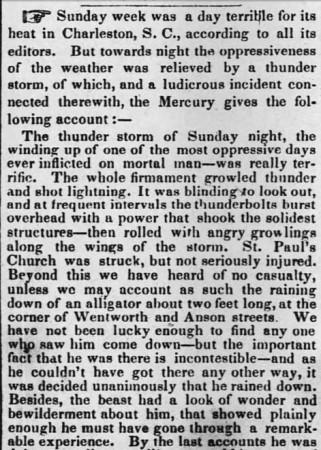
ARTICLE
CHARLESTON, SC – According to the National Weather Service Charleston office, on July 2, 1843, there were reports of an alligator falling from the sky during a thunderstorm in downtown Charleston.
A search for the event, turned up an old newspaper clipping from the Time-Picayune in New Orleans. The Time-Picayune republished an article which originally appeared in “The Charleston Mercury” a local paper founded by U.S. Representative Henry L. Pinckney.
The article described a strong thunderstorm that developed on a very hot July Sunday. St. Paul’s Church was reportedly struck by lightning but not harmed. No one was reported dead following the storm, but an alligator appeared at the corner of Wentworth and Anson street in downtown Charleston after the storm had cleared. And while no one saw the alligator actually fall from the sky, the writer states that “and as he couldn’t have got there any other way, it was decided unanimously that he rained down.” That and the look of wonder and bewilderment on the alligator’s face led to idea that he had come from the sky.The working theory is the gator could have been picked up by a waterspout the formed over a near by river or creek and was dropped on Anson Street as the spout dissipated. But since no one saw the gator fall from the sky, it could also be he just got lost in the blinding rain.
-
Well... it is another Friday, another day to love, to Oxum, Oshun, Freya, or Venus, another day to Kizomba!
A 2015 routine from africadancar. showing Victoria side Silvio; they love popping; their sequence starting around 1:45 i never saw before; the attempt alone was worth a try, but not an easy form. -
Superman will be Black
VIDEOMY REPLY
He makes a few points.
1st- news to me, I didn't know superman is going to be negro. I concur, old characters develop followings over time. King Arthur is not gay. If someone tried to make it where he was sleeping with lancelot it will be rejected.
2nd- he is correct that initially black comic book characters have made money. But he misses DC/Warner bros problem.
Take away Milestone, take away Marvel characters like Blade or the XMen or Spider man that now all are under Disney's roof. Name the top 5 DC black characters?
Warner bros. see's money in courting the non white male. But DC Comics don't have a black panther/blade/storm/Luke Cage/Moonstone/Psylocke. so...
3rd Both DC or MArvel are guilty of trying to court non white audiences by forcing a race change on a character. Look at what marvel did with captain marvel, a character that has a long complicated history of changes, and made a muslim girl captain marvel while captain marvel is still the blond haired woman flying in the stars...
4th- As Anthony McKay said, I am paraphrasing, I Am not playing Falcon, Falcon is being played by me. I think sometimes you get a personality like Momoa playing a lower character like Aquaman. You see the same thing with Deadpool/Doctor Strange/Black Widow/Nick Fury... as the actors who played them dominate their perception but that is cause none of them were well known outside comic circles beforehand, and the actors who portray them have a large media profile or following before them. That is why Downey Jr was able to dominate Iron man in a way he wasn't sherlock holmes. I never forget people saying with the first film, what is this martial arts? I have to admit the street fighting took me by surprise. I never forget how some fans ecried when Jackman was in his last wolverine depiction. Wolverine is not dead, but the audience is influenced.
I have to admit the street fighting took me by surprise. I never forget how some fans ecried when Jackman was in his last wolverine depiction. Wolverine is not dead, but the audience is influenced.
5th- I end with , the video creator is correct, the goal is not to make money. The goal is to supercede the money made and that is where the problem resides. If Warner Bros/DC focused on a Black Lightnin project, as he is their first black titular character. It will make money but it will not make superman money and that is what the studios fail to realize is their problem.
Going forward, an issue about new characters. I argue that DC spent too much time rebooting batman/superman and gave to little time to bringing in new characters. why is it: martian manhunter/green arrow/hawk woman or hawkman/black canary/mister terrific not have a film yet? These characters are as old and still remembered, I argue DC or MArvel is missing a trick by focusing on a narrow set of characters. TO be blunt, huntress/black canary warrant a standalone movie, that birds of prey was premature. Marvel's problem is simple, can they move on from iron man/captain america. Can Marvel let characters die and stay dead, that is the question. The avengers don't need captain america or iron man or vision or black widow to come back. I think they should all stay dead. The black widow movie is a temporal prequel. I think they need to respect the world they created and make Shuri black panther. It makes sense. Tchalla died by some rare space disease or whatever. Make sHuri the black panther. harry potter fans still complain about gambon as dumbledore -
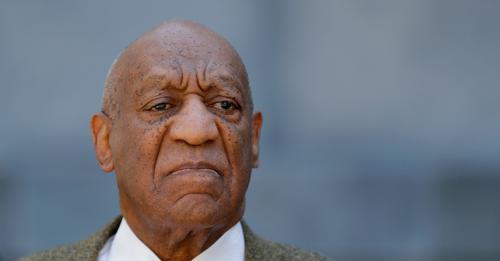
Many people have opined that nothing has changed for them concerning Bill Cosby
That is the same for me, but it is necessary to say why. My why is the following:I have never been a cosby fan. IS he a financially successful black entertainer? yes. Has he helped many people in the black community? yes. Do I know bill cosby? no. Do I think he is guilty or innocent of crimes? no to either, cause I do not know. ... I am happy for his personal success or those he helped. I know most people in the entertainment business have activities that are best not known, so Bill Cosby may be guilty , but he also may not. I love my father, growing up I didn't need nor do I need know a fictional black father. I knew my bloodlines history as a child. I am proud of it. I think for many black people, unfortunately, Bill cosby the man or the huxtable fictional clan on television as a number 1 show filled many roles that I did and do not need. Black people: having a home that has signs of opulence, graduating from college, having no one drugs in the house, a home with two black fiscal earners, in a neighborhood with little crime , are not things Foreign to me. And I had one better, cause I gre up in a black community, not a white one like the huxtables. I do comprehend that for many black people Bill Cosby served a role that they needed and still need. How many black women today still talk about the black man who isn't a doctor/layer , isn't a loving father, isn't a loving husband, isn't a provider, isn't an assister.
The legal scenario he was in seemed contrived, but when you put lawyers/fiscally wealthy negro/accusation(s) together you get explosions. To women... or anyone violated/abused, I repeat, go to the law immediately. THe one constant with many of the cases in the so called MeToo era is the temporal delay. I have seen photos of abused women, who went to law enforcement. Their bodies showed an evidence that would had put Cosby or Weinstein in jail instantly.
Abused people, go to la enforcement. -
My submission for the Sylessae draw in your style invitational on deviantart https://www.deviantart.com/hddeviant/art/Sylessae-Draw-THis-In-Your-Style-884297630
My version of Sylessae in my calligraphic art style

HEre is the poem I title: Sylessae
Moon
Terran Companion
Turning the solar gaze into embrace
Luna
L'etudiant de la vie d'existence
Toujours, silencieuse aux secrets
There is a fae, some name Sylessae
born when the moon form, the Earth's her dorm
Four verse to say, hope she wel and fray
... Frog rtrip over, mushroom, plash plus slime
Throat too gulp, sound like, a great big loom
Frog trip over, mushroom, plash plus slime
Hop to flee, tarsals, felt all boom
The Shadow from Sylessae
tell no lies
hear Bacchae
She kill in her month name may
The Shadow from Sylessae
say again
hear Bacchae
she kill in her month name may
If you want to read more of my poetry , please utilize the following https://www.kobo.com/ebook/poetry-or-more-1 -
Tumblr List of music concerning Black culture
-
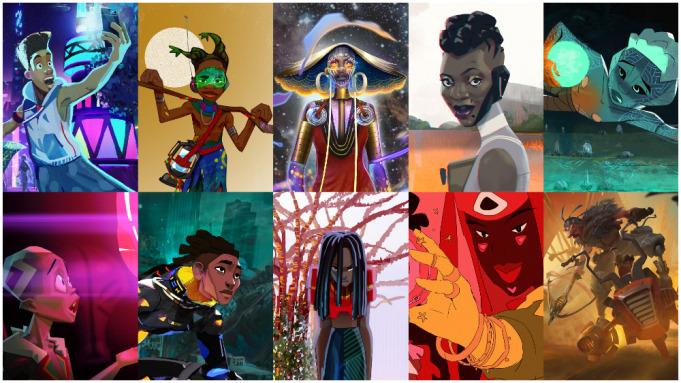
Disney Taps Top African Toon Talents for Animated Anthology ‘Kizazi Moto’
Disney has tapped top toon talents from across the African continent for “Kizazi Moto: Generation Fire,” a Disney Plus Original anthology of animated films set to premiere on the Mouse House’s streaming platform in late 2022.
Inspired by the continent’s diverse histories and cultures, the 10-part anthology brings together a slate of rising animation talents from six African nations to produce action-packed sci-fi and fantasy stories that will present bold visions of advanced technology, aliens, spirits and monsters imagined from uniquely African perspectives.
Oscar-winning director Peter Ramsey (“Spider-Man: Into the Spider-Verse”) will serve as executive producer, with Tendayi Nyeke and Anthony Silverston as supervising producers. Cape Town-based animation house Triggerfish, which received the prestigious MIFA Animation Industry Award in Annecy this year, will be the lead studio for the anthology, working in collaboration with animation studios across the continent and globally.
“We are bringing the work of a visionary new generation of African filmmakers to Disney Plus,” said Disney Plus and ESPN Plus president Michael Paull. “In addition to delivering thrilling animation for fans of all ages, this collection of ten original films taps into the Afrofuturism phenomenon which was turbo-charged by Marvel’s ‘Black Panther’ and reflects Disney’s ongoing commitment to partnering with leading global talent to tell the stories of the world from fresh and authentic points of view.”
“I’m really pleased to be part of a ground-breaking, fresh and exciting project that’s aimed at exposing the world to a whole new wave of creativity and invention from a place that is just ready to explode onto the world animation scene,” said Ramsey. “The films in the anthology kind of run the gamut when it comes to science fiction. There are stories that touch on other worlds, time travel, and alien beings, but all of these genre conventions are seen through an African lens that makes them totally new. I can’t wait for people to have their minds blown and say, ‘I want more!’”
More than 70 leading directors and creators across the continent were invited to pitch their ideas, after a multi-year research phase that included input from Ghanaian comic book blogger Kadi Tay, award-winning Congolese animation supervisor Sidney Kimbo-Kintombo (“Avengers: Endgame”) and Namibian-South African producer Bridget Pickering (“Hotel Rwanda”).
The process was curated and produced by the team at Triggerfish, including supervising producer Tendayi Nyeke, head of development Anthony Silverston, and Kevin Kriedemann, who proposed the initial idea for the anthology.
15 shortlisted projects were mentored by Ramsey and the creative teams from Triggerfish and Disney. The final 10 films are from Ahmed Teilab (Egypt), Simangaliso “Panda” Sibaya and Malcolm Wope (South Africa), Terence Maluleke and Isaac Mogajane (South Africa), Ng’endo Mukii (Kenya), Shofela Coker (Nigeria), Nthato Mokgata and Terence Neale (South Africa), Pious Nyenyewa and Tafadzwa Hove (Zimbabwe), Tshepo Moche (South Africa), Raymond Malinga (Uganda) and Lesego Vorster (South Africa).
Each film will be roughly 10 minutes long, and together will comprise a feature-length anthology of original animation that will be released as a Disney Plus Original across the globe.
“‘Kizazi Moto’ derives from the Swahili phrase ‘kizazi cha moto,’ which literally translates as ‘fire generation,’ capturing the passion, innovation and excitement this new cohort of African filmmakers is ready to bring to the world,” said Nyeke. “‘Moto’ also means fire in several other African languages, from Rwanda’s Kinyarwanda to Shona, a Zimbabwean language, speaking to the pan-African spirit we hope this anthology embodies.”
The announcement comes on the heels of a presentation on Wednesday by Walt Disney Animation Studios’ chief creative officer Jennifer Lee, pan-African entertainment company Kugali filmmakers Ziki Nelson, Hamid Ibrahim, and Tolu Olowofoyeku, WDAS VFX supervisor Marlon West and head of story Natalie Nourigat, who presented a sneak peek during the Annecy Animation Festival of their groundbreaking collaboration, the futuristic animated series “Iwájú,” which is slated for a 2022 release on Disney Plus.
ARTICLE URL
< https://variety.com/2021/film/global/disney-plus-kizazi-moto-annecy-1234998580/ >


